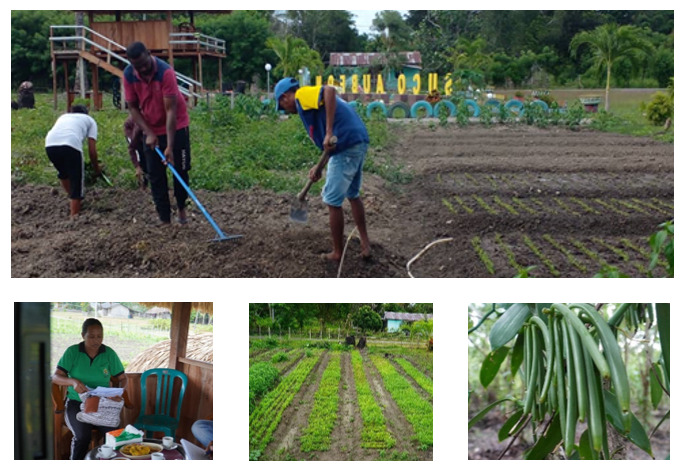The ATSEA-2 project has been collaborating with the Hader Foundation, a local non-governmental organisation that supports the implementation of home gardens in the Manatuto Municipality of Timor-Leste, specifically in Aubeon; a drought-resistant village in the Barique Administrative Post. The primary goal of the home garden program is to support livelihoods in the community. It focuses on agriculture and aquaculture, with specific activities including the cultivation of vanilla, vegetables and corn, along with raising chickens, pigs and fish.
To support the beneficiary farmers, the Hader Foundation has conducted training sessions on various topics, including cultivating dry and wet organic fertilisers, expanding and nurturing gardens, breeding vanilla brood stock, administering animal vaccines, processing fish feed and gaining access to marketing opportunities. The training was facilitated by skilled trainers from the National University of Timor-Leste (UNTL) and was conducted over a period of three days.
The program featured approximately 20 farmers divided into different groups, each with a specific focus area. The groups included eight farmers who focused solely on growing vanilla; three subgroups comprising between five and ten members each, dedicated to planting vegetables and producing wet and dry organic fertilisers; another group of eight individuals, who focused on corn cultivation; and two main groups for chicken rearing and pig farming, comprising five to ten members each. Additionally, there was a group of eight farmers who concentrated on aquaculture, specifically raising fish and producing fish feed.

including chili and vanilla, in the agricultural lands of Aubeon Village
In coordinating the home garden program, the collaboration between the ATSEA-2 Project and the Hader Foundation has played a crucial role among local authorities and leaders. Specifically, this has involved providing an introduction to the program and conducting coordination meetings for Municipality leaders, local authorities, veterans and the Ministry of Agriculture and Fisheries’ Municipality Director and staff.
The home garden initiative forms part of wider efforts to support communities through farming; helping them expand their livelihoods beyond fishing activities so they have alternative sources of income, particularly when the weather is not conducive to fishing activities. The farmers have received support from the ATSEA-2 Project in the form of seed for several crops, including papaya, onion, mustard greens, lettuce, bitter gourd, melon, cucumber, watermelon, tomato, drumstick, cabbage, water spinach, aubergine, mung beans, peanuts and corn.
This initiative plays a vital role in supporting the livelihoods of the Aubeon Village community. It has the potential to help build greater resilience in the community and promote sustainable development, while also supporting the conservation and sustainable use of marine resources.
By Dominica Guterres
This article is also published in IW:Learn


